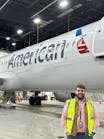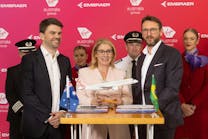Boeing Tells Workers Terms of Voluntary Layoffs, Says Air Travel Recovery Will Take Years
Boeing CEO Dave Calhoun told shareholders Monday the impact of the staggering business downturn due to the coronavirus pandemic is likely to affect the company through 2023 and beyond.
“We expect it will take two to three years for travel to return to 2019 levels and an additional few years beyond that for the industry’s long-term trend growth to return,” he said.
Speaking at the company’s annual meeting of shareholders, which was held virtually because of the pandemic, he added that when the commercial airline market stabilizes, it “will be smaller and our customers’ needs will be different.”
As an initial step in its plan to reduce the size of its workforce, Boeing separately told U.S. employees Monday what it’s offering to those willing to take a voluntary layoff — which starting in early June will bring a first wave of “several thousand” job cuts.
Calhoun’s address to shareholders offered an indirect glimpse at the sweep of the cuts ahead when he referred to the prospects for Boeing’s thousands of suppliers. Before the pandemic they had been gearing up for accelerated production rates after the expected clearance for the 737 MAX to return to service.
“The plans they have made and the investments they have made around the future, not dissimilar to ourselves, they now have to tear up and start over and resize themselves to accommodate that new future,” Calhoun said.
On Wednesday, when Boeing announces its first-quarter financial results, Calhoun is expected to provide details on steep reductions in jet production rates, which are likely to spur thousands of local job losses.
Boeing was already reeling financially from the grounding of the 737 MAX, now expected to extend into late summer. Calhoun on Monday described the additional shock to Boeing of the coronavirus devastating its airline customers. He said 2,800 planes are grounded in the U.S. alone and passenger traffic is down 95%.
Executives at top airlines have issued equally dire forecasts in much the same language as Calhoun. United Airlines CEO Oscar Munoz warned employees in an April 15 memo of “tough decisions ahead as we plan for our airline, and our overall workforce, to be smaller than it is today.”
Similarly, Delta CEO Ed Bastian, announcing a first-quarter loss of $422 million on Wednesday, said “we’ll be a smaller industry coming through this.”
Describing this as a crisis “unlike anything we have ever experienced,” Calhoun said airlines are “grounding fleets, deferring airplane orders, postponing acceptance of completed orders and slowing down or stopping payments.”
In response, Calhoun said, Boeing needs to change production rates “to balance supply and demand.” He said that details on the rate cuts must wait until Wednesday.
Ron Epstein, aerospace analyst with Bank of America Global Research, said Calhoun’s estimate that demand won’t recover to 2019 levels until 2022 or 2023 implies that airline growth — which he said typically fuels about half the market for new planes — will be nonexistent until then.
“That’s pretty meaningful cuts,” Epstein said.
Calhoun referred only briefly to the termination Saturday of Boeing’s proposed acquisition of the commercial jet business of Brazilian manufacturer Embraer, previously promoted as a strategic priority of the company.
He stuck strictly to the statement issued when the collapse of the deal was announced: The two sides could not resolve “critical unsatisfied conditions” in the negotiations.
Embraer reacted bitterly to Boeing’s decision and said Monday that it has begun arbitration proceedings. Boeing maintains that it doesn’t have to pay a $100 million termination fee.
Calhoun offered no news on the timing of the return of the 737 MAX to service.
The restrictions during the pandemic have slowed the work of winning Federal Aviation Administration approval for the 737 MAX to fly again. A person familiar with the details said Boeing’s target schedule has slipped from midsummer to late summer.
“No new issues have been identified,” that person said, then added that documenting and testing the software changes to the plane’s flight controls “is taking longer than expected and this need for virtual work is beginning to have some impacts.”
However, Calhoun did not disclose any new delay Monday. He said only that “progress has continued during the pandemic.”
No shareholder dividends anytime soon
Asked about how the threat of the coronavirus might affect the design of future airplanes, Calhoun hinted at potential changes to filtering and recirculation of air in the passenger cabin.
He said that airlines will have to define how they want the passenger cabin protected. Boeing’s role, he added, is to make sure the airlines and their passengers understand “exactly how air is moved in and through the fuselage and ultimately what exposures that creates.”
Without providing details, he said he’s confident “we will have a safe environment for the flying public.”
Ahead of Boeing’s earnings results Wednesday, Calhoun offered only a few nuggets of financial information, without revealing any material details.
In answer to a question about pensions that has worried Boeing retirees, he asserted unequivocally that the company pension plan is secure.
The dramatic fall in Boeing’s stock price — more than 60% lower since the start of the year — has caused concern among retirees because management chose to fund the pension plan in part with company shares.
But Calhoun offered reassurance: “There’s nothing I see that would put risk into the pension plan,” he said.
Responding to a shareholder question about when the company would resume paying dividends, Calhoun said bluntly, “It will be years.”
He said the company will have to borrow heavily in the next six months “to get through this very difficult moment.” Repaying that debt would be the priority, not giving cash to shareholders, he added.
Despite the grim outlook for the next couple of years and beyond, Calhoun expressed optimism about the company’s eventual recovery.
Citing the industry’s underlying demand fundamentals — the need to connect the world’s economies and a growing middle class around the globe with the resources and desire to travel — he said he continues “to believe strongly in the future of aviation and of Boeing as the aerospace leader.”
“There is no doubt people will start flying again,” he said. “And as the industry recovers, slowly at first and then with greater vigor, we’ll be ready.”
Later on Monday, Boeing announced it will resume operations at its North Charleston, S.C. facilities with most workers reporting back on May 3 or 4 after just shy of a four-week stoppage.
Following coronavirus-driven shutdowns at most locations across the country to clean facilities and re-orient the workplace to allow social distancing, when South Carolina goes back, all Boeing’s operations will have reopened.
Still, management’s focus for now is on how to shrink the workforce to match demand.
Boeing told employees Monday its Voluntary Layoff (VLO) program will provide eligible employees with one week of pay for every full year of service up to a maximum of 26 weeks, as well as three months of continued health care coverage.
White-collar employees in the Society of Professional Engineering Employees in Aerospace (SPEEA) union will get those terms. The International Association of Machinists (IAM) union told its members Monday that, while the same pay offer applies to them, their contract will give them up to six months of continued health care coverage.
Employees with certain critical skills and levels of security clearance and those who work on certain priority or government programs may be excluded from participation.
Those who apply will get a decision on their eligibility by mid-May, with June 5 the last working day for most of those approved.
Boeing spokesman Bernard Choi said Monday “we are expecting several thousand employees to take the VLO or retire.”
This story has been corrected. It briefly included information supplied by the Society of Professional Engineering Employees in Aerospace (SPEEA) union that proved incorrect. The information, concerning expected job cuts by Boeing, has been removed. Boeing has not provided the union any estimate of the number of job cuts that are planned.
———
©2020 The Seattle Times
Visit The Seattle Times at www.seattletimes.com
Distributed by Tribune Content Agency, LLC.


